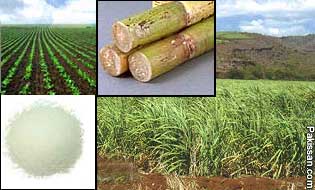|
Is the on-going sugar crisis
artificial?
By Zafar Samdani
THE issue of soaring price of sugar was placed on the desk
of the President of Pakistan, the all powerful General
Pervez Musaharraf, on February 7; the issue was then over a
year old and had already attained unprecedented scandalous
proportions because the price had at least doubled during
the fiscal year.
 One
has no first hand information on the brief presented to the
head of the state but his response and the measures he
identified for resolving the crises suggest that the
briefing could not have been accurately depictive of ground
conditions. One
has no first hand information on the brief presented to the
head of the state but his response and the measures he
identified for resolving the crises suggest that the
briefing could not have been accurately depictive of ground
conditions.
Apparently, Pakistanís uniformed ruler was given an easy to
comprehend explanation of developments leading to what has
become one of the worst food related shortage scandals in a
country whose history is replete with such scams.
The President ordered action against sugar hoarders and
issued instructions for ensuring that the publicís
requirements are met at any cost. The escalating price of
sugar cannot be attributed simply to hoarding though
admittedly hoarding is a component of the crises.
It has been hoarding of a totally new kind because the main
agency involved in keeping stocks away from the market when
they could have been used for stabilizing rising price was
state-owned. It could only have allowed elements
specializing in exploiting human needs and giving black
marketers a free run of the show under the instructions of
the government.
The culprit in this case is the Trading Corporation of
Pakistan (TCP) that has stocks of refined sugar of about
200,000 tons. They could have been used to control the
situation. These stocks had been purchased from sugar mills
to provide them relief and enable them to off-load excess
produce. This isnít something from the distant past but an
event that took place only last year.
The idea was that the sugar mill owners had been going
through a difficult period and needed to be bailed out. What
makes an industry producing in excess of marketís demand
eligible for state support and resources of the national
exchequer are anybodyís guess but this is exactly what had
happened.
Many sugar mills of the country were thus provided financial
assistance by the government in a situation that was not the
responsibility of the state. The decision was clearly a case
of the stateís backing for a resourceful segment for the
exploitation of national resources and rake off operations
against the general public.
 Purchase
of stocks from sugar mills providing incontrovertible
evidence of the government backing, mill owners has been one
factor in the building of the current sugar price crises;
another has been mill ownerís reluctance to pay growers for
the supply of cane. In this case too, the government is seen
on the mill owners side of the fence. Purchase
of stocks from sugar mills providing incontrovertible
evidence of the government backing, mill owners has been one
factor in the building of the current sugar price crises;
another has been mill ownerís reluctance to pay growers for
the supply of cane. In this case too, the government is seen
on the mill owners side of the fence.
This isnít a problem dating to the present regime or of its
creation but an inherited one from the period when rulers
felt that setting up a sugar mill was a vehicle for making
high profits. As a result, sugar mills were established all
over the country, particularly in Punjab province and the
owners of many of these mills treated cane growers with
contempt because the farmers were helpless before them.
Laws protecting the interests of growers very much existed.
They were strict to the extent of authorizing the district
magistrate to arrest defaulters. But the officials could not
move to implement laws because civil servants have, by and
large, subscribed to caution-to be read refusal to use
authority when that could put them in confrontation with the
higher authority. No action was consequently taken against
millers defaulting on payment to growers.
The payments piled up and reached millions of rupees. When
the government changed, many of vested interest elements
from the sugar industry had no hesitation to team up with
the new set-up to save their skin. As for laws protecting
farmerís interest, I am not sure if they are still on the
statutes because the so-called devolution of authority has
installed institutions that do not cover the full ground.
The office of the District Magistrate has been eliminated
and its powers have not been allocated to any other office
in many cases. The grower has nowhere to go now.
While purchasing the excess stocks from mill owners and
making delayed payment to growers or paying them just enough
to ensure that they accept the continued suffering have been
bad enough aspects of the sugar industry, its worst
contribution has been delayed crushing, an issue that crops
up practically every year. The regrettable aspect of delayed
crushing is its negative impact on the wheat crop that
replaced it in many fields across the country.
The overall produce of the main food crop is undermined by
the sugar mills policy of late start of the crushing season.
The government should have been taking strict notice of this
situation but the best that is done is holding negotiations
with millers and ultimately accepting their point of view to
the detriment of the wheat crop and the national interest.
All these factors have contributed towards creating a crisis
of shortage of the commodity and resultantly its rising
price. However, these factors did not fall in line
automatically and were manoeuvred towards a specific end by
a plan jointly managed by elements that should have been
working to control the price escalation and meet the
shortage of the commodity.
An effort was seemingly made to reduce the demand-supply gap
by importing sugar last year. The TCP opened tenders for
importing 50,000 tons of sugar in August 5. The organization
was reported to have plans for importing 300,000 of sugar
and contracts for the import of the bulk of that quantity
were made towards the early part of the current fiscal. In
addition, sugar mills made contracts for importing 400,000
tons of sugar by August last year and 22,000 tons sugar also
reached Pakistan from China by that time.
According to the official count, Pakistan needs about one
million tons of sugar to bridge the demand supply gap. The
above quantities plus stocks with the TCP should have been
sufficient to meet any shortfall but they cannot if the
commodity is not released in the market. This can be summed
up as a plan for allowing rise in the price of sugar. The
crises, it appears, is man- made - the result either of
mismanagement or even more deplorable reasons.
The latest move to resolve the crises is a strange one.
Supply to the Utility Stores has been doubled with a view to
providing relief to the public. The Utility Stores are
selling sugar at Rs27 per kg while it is being sold in the
market for Rs42 for the same quantity. Can a commodity be
sold at two different prices with creating additional
problems? The answer is in the negative. In any case, a
price difference of Rs15 is unheard of and, to the say
least, is not natural.
Also to say the least, the sugar crisis is artificial.
Courtesy: The DAWN
|
Pakissan.com;
|